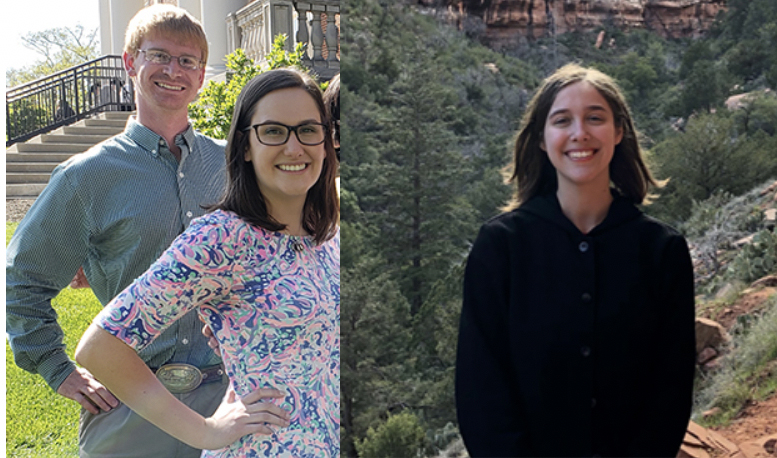
Lexie Adams and Hope Kirby named Goldwater Scholars
By Susan Meikle, university news and communications
Miami University juniors Alexandra (Lexie) Adams and Hope Kirby have each received a Goldwater Scholarship for 2020-2021. They are among 396 students nationwide to receive the scholarship, the premier undergraduate award of its type in the fields of mathematics, natural sciences and engineering.
Adams is a chemical engineering major and Spanish minor from Liberty Township. Kirby is a microbiology major and geology and bioinformatics double minor from Glendale, Arizona. They are two of 13 students from an Ohio public university to receive the award.
The Goldwater Scholarship
The Goldwater Foundation Scholarship Program encourages outstanding students to pursue careers in the fields of mathematics, natural sciences and engineering, Nationwide, faculty nominated 1,343 students — from a pool of more than 5,000 — for the scholarship, worth up to $7,500 per year.
Paul Urayama, associate professor of physics and Miami’s Goldwater faculty representative (and 1993 Goldwater Scholar from University of California-Irvine) said, “This is the ninth year in a row for a Miami student to be named a Scholar. I am so proud of what our nominees have accomplished.”
Lexie Adams
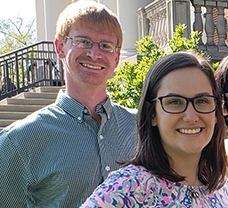
Andrew Jones (left) and Lexie Adams
Adams connected with her faculty mentor, Andrew Jones, assistant professor of chemical, paper and biomedical engineering, in the fall of 2017 — the first semester at Miami for both of them.
Since then, she has been part of Jones’s research team working on metabolic engineering and the production of psilocybin in the Escherichia coli bacteria. Psilocybin is a promising drug candidate that could help patients with treatment-resistant depression.
The project involves genetically manipulating E. coli to produce the psilocybin molecule from a series of enzymatic steps first discovered in the Psilocybe mushroom, Adams said.
She was a lead author on a paper describing their results published last fall in the journal Metabolic Engineering: In vivo production of psilocybin in E. coli.”
She has been working to further the development of the pathway in E. coli, as well as use the pathway to produce other molecules of interest.
“Lexie has made lasting contributions to research in my laboratory,” Jones said. “Her strong work ethic and positive attitude have shaped the laboratory culture by pushing her fellow researchers, including myself, to do their respective best.”
Adams was recognized with the 2019 Student Organization Leader Award from the office of student activities for her work with the Miami chapter of Engineers Without Borders (EWB).
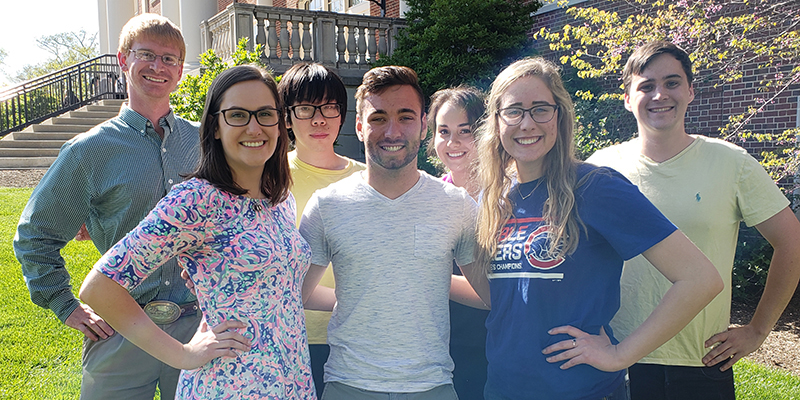
Adams with Jones and other members of his research group (photo by Scott Kissell).
As EWB outreach chair, she developed the first semi-annual Talawanda Engineering Day, which brings eighth graders to campus for a half-day of STEM activities. She is currently the EWB education chair.
She is also a member of the professional engineering fraternity Theta Tau and of the engineering honor society Tau Beta Pi.
She was an Undergraduate Summer Scholar (USS) in 2018.
“Without that experience, I do not think I would have had the opportunity to be published or win an award such as the Goldwater Scholarship,” she said. (USS, Miami's marquee undergraduate research program, is now canceled for this summer, due to the pandemic.)
Last summer she was selected to participate in the National Science Foundation’s Research Experience for Undergraduates (REU) program, working in the protein engineering research lab of Mark Blenner at Clemson University. “This work was really fascinating because it used the skills I had learned in the Jones lab, and I learned new procedures in Dr. Blenner’s lab,” Adams said.
This summer, she will be working as an intern — perhaps remotely — for Eli Lilly Pharmaceuticals.
Adams plans to pursue a doctorate in biomedical engineering after graduating from Miami.
During the coronavirus pandemic and Ohio’s stay-at-home orders, she misses working in the Jones lab. “I cannot wait for next fall and all the work we will be very excited to complete,” she said.
Hope Kirby
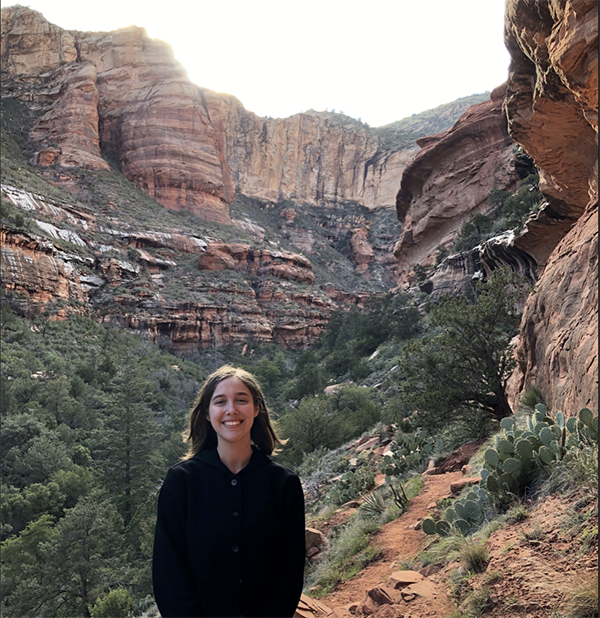
Hope Kirby in Sedona, Arizona (photos courtesy of Kirby).
Kirby joined the lab of her faculty mentor Luis Actis, professor and chair of microbiology, her first year at Miami.
Originally a pre-medical studies co-major, she was attracted by the medical implications of his research on the bacterium Acinetobacter baumannii. The antibiotic resistant bacterium can persist in medical environments and cause serious infections in humans.
“Ironically, by the time I actually started working in the lab I realized that the only reason for my interest in medicine was the science,” Kirby said.
She studies the way A. baumannii responds to light.
“Understanding the main systems in the bacteria that are light-dependent could be key in understanding how the pathogen works," she said. This work is primarily done through genetic work with molecular cloning and biochemical assays.
"Hope stands out as one of the best among the more than 50 undergraduates I have supervised," Actis said. "She has an amazing capacity to listen, learn and respond by understanding methods, interpreting data and relating them to published observations."
Kirby had been preparing to present her research with Actis at the national American Society for Microbiology Microbe 2020 meeting in June, but the meetings are cancelled due to the coronavirus pandemic.
Kirby is the co-president and cofounder of Miami’s Microbiology Club. She is a supplemental instructor in the biology department and is also a small-group leader at Oxford Bible Fellowship.
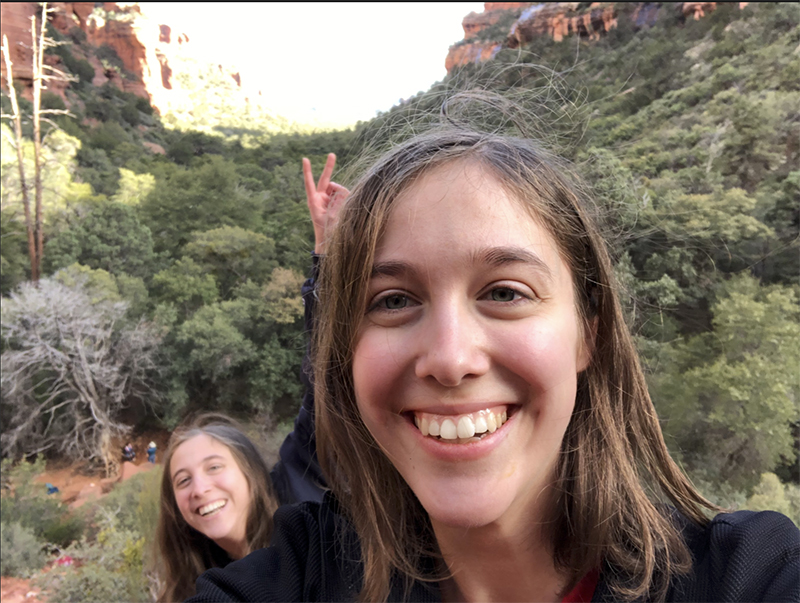
Kirby, with her twin sister, making the most of family time during the coronavirus pandemic.
She is a member of Miami's LSAMP student program and a College of Arts and Science Ambassador. “I hope to assure potential incoming students of the wonderful home the microbiology department provides,” she said.
Kirby plans to pursue a doctorate in microbiology after graduating from Miami.
She was recently named one of Miami's two Beckman Scholars and is looking forward to rejoining the Actis lab when campus reopens.
During this stay-at-home period, she plans to conduct some bioinformatic analysis from home and read journal articles and other scientific literature.
“This time has forced me to slow down and remind myself of the true important things of life. I’ve been able to spend quality time with a family I rarely get to see, and play piano in a place where I can sing as loudly as I want to," she said.
